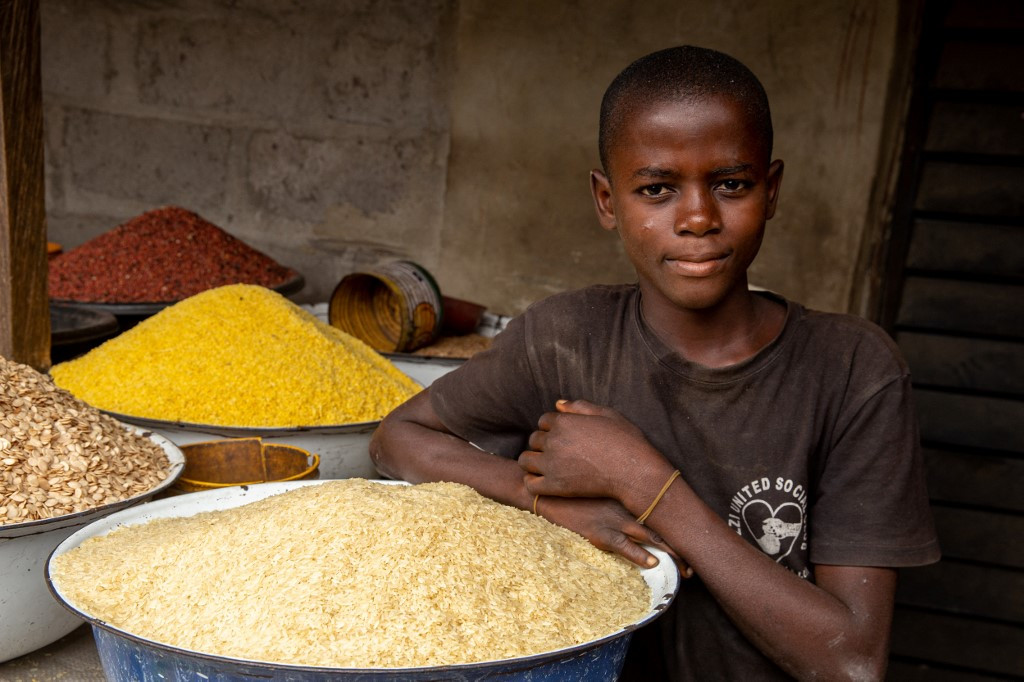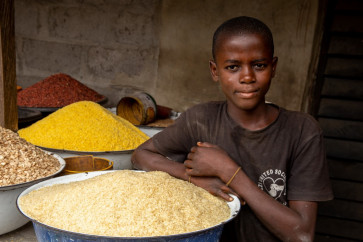Popular Reads
Top Results
Can't find what you're looking for?
View all search resultsPopular Reads
Top Results
Can't find what you're looking for?
View all search resultsHow Africa is bearing the brunt of palm oil's perfect storm
"I didn't even want to sell anymore because I thought, if the price of oil had gone up that much, what am I going to earn?" she said as she stirred a batch of cakes at her street-side stall in Ivory Coast's lagoon-side commercial capital.
Change text size
Gift Premium Articles
to Anyone
 A young boy poses next to some rice in his shop at Ajara Market in Badagry, near Lagos, on September 6, 2019. The days of heaping 50-kilo sacks of rice across the saddle of their motorbike and slipping a few notes to a customs officer are now gone. With Nigeria having snapped its borders shut, the legions of motorbike riders who used to satisfy the nation's hunger for imported rice are lucky at best to sneak through a few packets of Basmati. (AFP/Benson IBEABUCHI )
A young boy poses next to some rice in his shop at Ajara Market in Badagry, near Lagos, on September 6, 2019. The days of heaping 50-kilo sacks of rice across the saddle of their motorbike and slipping a few notes to a customs officer are now gone. With Nigeria having snapped its borders shut, the legions of motorbike riders who used to satisfy the nation's hunger for imported rice are lucky at best to sneak through a few packets of Basmati. (AFP/Benson IBEABUCHI )
D
jeneba Belem's fried bean cake stall in Abidjan is a world away from the war raging in Ukraine. But her business is now at the mercy of an unexpected consequence: runaway palm oil prices.
"I didn't even want to sell anymore because I thought, if the price of oil had gone up that much, what am I going to earn?" she said as she stirred a batch of cakes at her street-side stall in Ivory Coast's lagoon-side commercial capital.
Neither Russia nor Ukraine produces palm oil, a tropical commodity, but Moscow's invasion has triggered knock-on effects across today's intricately interconnected global economy.
The conflict has helped propel prices for palm oil - ubiquitous in African dishes from Nigerian jollof rice to Ivorian sticky alloco plantains - to record highs that experts say will deepen a food-cost crisis and punish the poorest.
The upheaval pushed top palm oil exporter Indonesia to ban some exports in recent days, in a effort to keep a lid on domestic prices. A senior government official said on Tuesday that the ban could be widened.
"We've never really tested this kind of situation," said James Fry, founder of agricultural commodities consultancy LMC International. "It will be the poorest in big countries or countries in Africa who will almost certainly have to bear the brunt."
Indeed in sub-Saharan Africa, food expenses already account for 40 percent of households' consumer spending, the highest proportion of any region in the world, and more than double the 17 percent spent on food in advanced economies.


















